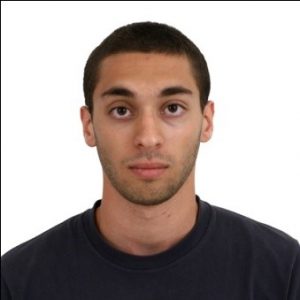Student Seminar Series 2017 – Session #1
We are pleased to announce the first session in our student seminar series 2017. Two of our students will be presenting on Wednesday, March 15 from 12:00 pm – 1:00 pm in ICE 8-207.
Seminar #1: Haitham Abu Damis – “Wearable and On-body Antennas for Biomedical Applications“
Abstract
Square-loop antennas for wearable applications in the 2.45 GHz (ISM) region are presented and compared. Both antennas were simulated, and then printed on flexible DuPont Kapton sheets for measurements. The standard square-loop antenna was modified by adding four circular patches to its sides in an effort to enhance performance. The new antenna is called the Quadruple Loop (QL) antenna. Simulations and measurement results show that the QL antenna demonstrated robust operation over a wider impedance bandwidth compared to that of the standard square loop antenna.
Biography
Haitham graduated from the Canadian University of Dubai (CUD) with a B.Sc. in telecommunications engineering. Throughout 2009-2013, he has worked with field programmable arrays (FPGA) and wireless sensor networks (WSN). As of 2014, he has been working on the development of body-worn antennas as part of his M.Sc. degree requirements.
Seminar #2: Rezvan Rafiee Alavi – “RWG MoM-via-Locally Corrected Nystrom Method for Source Reconstruction of Planar Very-Near-Field Measurement and Its Acceleration Using Multi-Level Fast Multipole Method“
Abstract
Locally Corrected Nyström (LCN) method is used to solve magnetic field integral equations (MFIE) of the equivalent current method (ECM) in the planar very near-field measurement of antennas and RF circuits. The exact relationship between Rao-Wilton-Glisson (RWG) method of moments (MoM) and first-order, and zero-order LCN is established for both magnetic and electric currents to ensure normal current continuity between adjacent triangular patches. The proposed method is a point-based RWG discretization of MFIE and causes a noticeable decrease in the degree of freedom. It consequently eliminates spurious charges and significantly lowers the condition number of the impedance matrix. Moreover, it is more efficient to be accelerated by fast algorithms such as multi-level fast multipole method (MLFMM).
Biography
Rezvan Rafiee received the B.S. degree from the University of Tehran in 2009, in electrical engineering, and M.S. degree from Iran University of Science and Technology, in 2013, in Telecommunication, Fields, and Waves. Currently, she is a Ph.D. student at University of Alberta, where she has been since May 2014. Her research interests include Antenna and Propagation, Passive and Active Microwave Circuits, Numerical Methods in Electromagnetics, Inverse Electromagnetic Scattering, and Remote Sensing, and Microwave Measurements.


